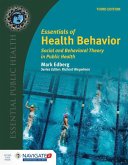This unique text examines health behavior theory, through the context of the "New Public Health". Health Behavior Theory for Public Health will provide your students with a balanced professional education - one that explores the essential spectrum of theoretical tools as well as the core practices. Divided into three sections, the book takes an ecological approach to learning about health behavior theory and its application. The reader will first gain a broad understanding of health, public health, health behavior and health promotion planning. This is followed by a straightforward and expansive look at the most commonly applied theories and approaches to public health research and programs. Students will come away with a clear understanding of how theory fits into the larger scope of public health research and practice. Finally, readers will learn about the essential tasks of measurement, evaluation, and translation through an examination a diverse set of application tools. The Second Edition is a thorough update that offers two new chapters, new examples of application in the field, as well as new photos, pull quotes, and box features to engage the reader in learning. Key Features: - A new chapter on intervention mapping that examines the value of using multiple theories to better understand and thus better resolve social inequalities and prevent disease - A new chapter on social network theory that explores the basics of network theory and the profound influence of networks on the health behaviors of people at all stages of life. - New examples of the application of theory such as the highly successful structural-level of intervention of Citibike in New York City - New timely and relevant examples that illustrate difficult concepts such as evaluation and the diffusion of innovation








